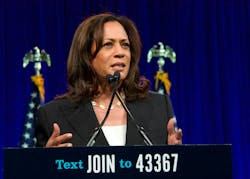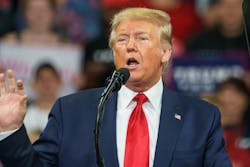Tariffs and emissions: What the different election outcomes mean for trucking
Donald Trump and Kamala Harris have diverging visions for America's future. While there is a long path from campaign statement to law, the winning candidate's policies could have massive repercussions for trucking through the rest of the decade.
The next administration will make key decisions impacting EPA emissions regulations, the California Air Resources Board's power, cross-border trucking operations, and more.
Emissions regulations in the crosshairs
The winning president's environmental policies will have a clear impact for the trucking industry: whether carriers (and their equipment) will be burdened by greater or weaker emissions rules.
“The different approaches to environmental policy could be one of the most impactful for the trucking industry,” Prasad Sharma, partner at Scopelitis and general counsel for the Truckload Carriers Association, told FleetOwner.
The next presidential administration will effectively control EPA rulemaking, granting control over enforcement of regulations like the GHG3 Phase 3 emissions rule for heavy-duty vehicles or CARB waivers. The economic cost of trucking’s electrification could be to the tune of roughly $1 trillion, according to the Clean Freight Coalition.
See also: Fleets explained: Emissions regulations
A Trump administration would likely try to repeal several emissions rules, including GHG3. A Harris administration would likely maintain current regulations.
“The Harris campaign has spoken much more forcefully and frequently about the dangers of climate change and the need to reduce emissions,” Sharma said. “A Harris administration would continue to keep the pressure on the trucking industry to transition to zero-emission trucks on what is, by most accounts, an untenable timeline. I would expect a Trump administration to be a stark contrast, with significantly more lax climate policies and a roll-back of regulatory efforts to force the transition to zero-emission trucks.”
Judge appointments more critical than ever
The power of appointment is one of the most influential powers for a president. The executive branch appoints federal agency personnel, judges, ambassadors, and more, with varied Congressional limitations.
Presidents appoint both federal judges and the leaders of federal agencies—but the appointment of judges gained significantly more value this year. When the Supreme Court struck down Chevron deference in June, it empowered federal judges with a new interpretive authority.
Judges now can ignore federal agencies’ reasonable interpretations of law, relying instead on their own interpretations. This alters the landscape of agency rulemaking. The new judicial power already presents an existential threat to any agency authority that doesn't have explicit Congressional approval, including EPA's ability to grant CARB waivers.
The president can now choose judges that align with their policies, making lifetime appointments into barriers against future administrations’ rules.
Trump has a history of rolling back environmental regulations. His administration repealed vehicle emissions rules and weakened clean energy rules. Now, the former president suggests he would cut Biden-era emissions regulations.
Harris, on the other hand, would probably maintain the Biden administration’s rules but not go much further. Harris made the tie-breaking vote to pass the Inflation Reduction Act in 2022, but now climate policy is not a major part of her campaign.
Congress still has sway over executive rulemaking, too. Agency rules are limited by the Congressional Review Act, which allows Congress to block specific rules. Conservative lawmakers are using the Congressional Review Act to try to repeal tailpipe emissions rules for light- and medium-duty vehicles.
Tariffs: A major executive economic tool
Presidents get too much credit for the economy. Whether a new president can fulfill their campaign promises for economic policies relies largely on the partisan makeup of Congress.
“Whoever wins will likely have to deal with a contentious Congress that will have narrow, if not divided, majorities,” Sharma said. “This will make execution of some policy preferences difficult for whoever wins the presidency.”
Funding and taxation are generally the domain of Congress—with many exceptions. The biggest exception for this election may be tariffs.
The president has a broad (and disputed) authority to enact taxes on imports or exports, called tariffs. Both parties broadly support tariffs on imports. Still, tariffs could be one of the most impactful parts of the 2024 election for trucking.
“Generally, while there are significant differences between the two candidates on social issues, tax policy, and approach to customary governmental norms, the competition for the votes of blue-collar workers has led to a surprising convergence in policies intended to boost domestic workers via increased domestic production—to the detriment of free trade,” Sharma said.
A tax on product imports has a direct impact on that product’s industry and, consequently, on the carriers that haul the goods.
While the president’s authority to execute tariffs has fuzzy limitations, both candidates support significant taxes on many imported goods. Trump voiced support for a fierce tariff strategy, while Harris likely supports a more moderate approach.
“These two candidates agree on nothing except one thing and that is trade policy,” Bob Costello, chief economist and SVP of international trade policy and cross-border operations for the American Trucking Associations, said at an Isaac Instruments user conference in October. “They both seem to be trying to outdo each other in that area, mainly around tariffs.”
Brief history of tariffs
Before the Trump administration, the last major U.S. tariff came against Chinese tire imports in 2009. Trump-era tariffs included steel and aluminum products, large residential washers and solar modules, and a litany of other goods.
On a strictly economic analysis, Biden’s Office of the U.S. Trade Representative found that recent tariffs harmed the overall economy but boosted the sectors directly affected. Still, Biden’s administration chose to keep the Trump-era tariffs and add new ones.
Biden’s choice may not be surprising, as tariffs can last a long time: A brief 1960s trade conflict with Europe to this day maintains a 25% tariff on light trucks imported to the U.S.
Trump’s tariffs stance could have the greatest impact on manufacturers. Trump has suggested a 10-20% tariff on all imported goods, a 60+% tariff on imports from China, and a 100% tariff on cars from Mexico.
However, as IndustryWeek’s Anna Smith and Jill Jusko report, Harris is likely to also support some tariffs. The Democratic candidate hasn’t explicitly stated a clear tariff position, but the Biden administration has maintained Trump’s tariffs and even boosted taxes on Chinese imports.
“Tariffs were an important and frequently used tool of the Trump administration, and on the campaign trail, he has doubled down on the imposition of significant tariffs. The Biden administration has left some of those tariffs—particularly those aimed China—in place, and I wouldn’t expect a Harris administration to be much different in that respect,” Sharma said. “However, I would anticipate a Trump administration would make broader use of tariffs as both a policy and revenue-generating tool.”
Some shippers are already moving additional volume before the election to brace for expected tariffs.
Tariffs could benefit trucking
Additional tariffs will likely aggravate inflation and have no immediate widespread economic benefit. However, tariffs bring some benefit to the trucking sector. Taxes on intercontinental imports move freight demand away from ports and onto trucks.
The best example of how tariffs help the trucking industry is Mexico. According to the U.S. Trade Representative, U.S. imports from Mexico exploded by 64% from 2012 to 2022. That growth is at least partially from tariffs on Chinese imports. More than 70% of freight moved between the U.S. and Mexico is moved by truck.
Growing U.S.-Mexico trade is a major contributor to continued record-breaking cross-border truck trade. Several major transportation companies are now expanding in Mexico, including Ryder, Motive, and Uber Freight.
“It is having a positive impact—even though it causes inflation because you pay more for those goods—in that we are seeing more nearshoring to North America,” Costello said. “I am bullish in that aspect of it going forward, even though I don’t love the way we got there.”
About the Author
Jeremy Wolfe
Editor
Editor Jeremy Wolfe joined the FleetOwner team in February 2024. He graduated from the University of Wisconsin-Stevens Point with majors in English and Philosophy. He previously served as Editor for Endeavor Business Media's Water Group publications.



